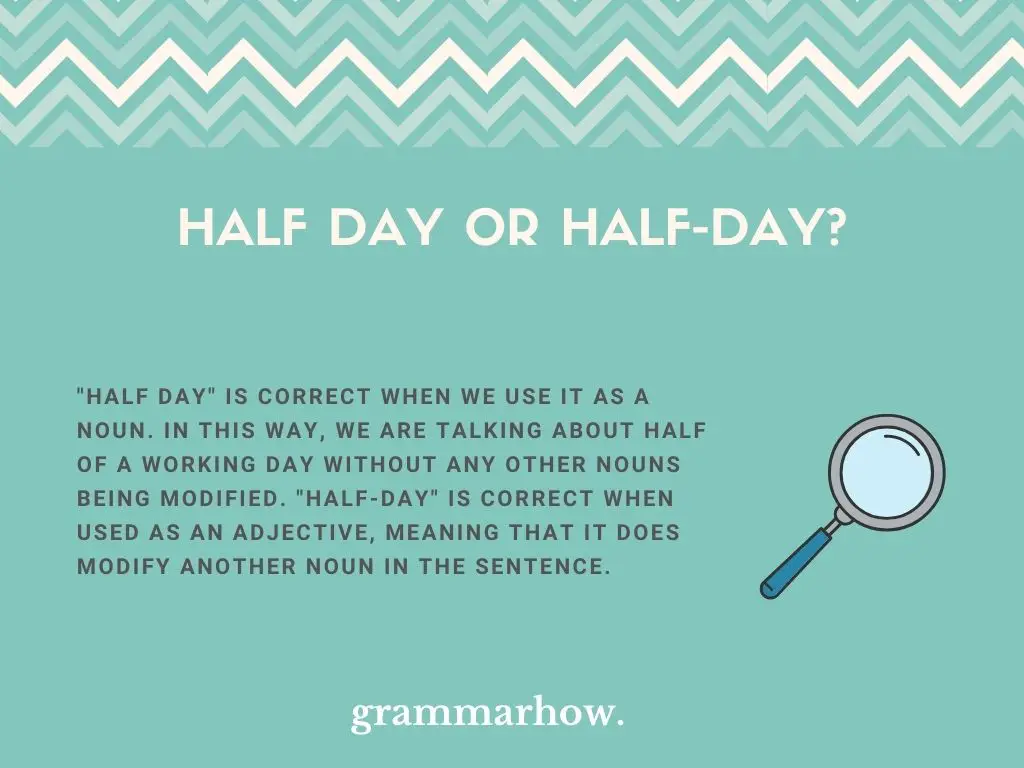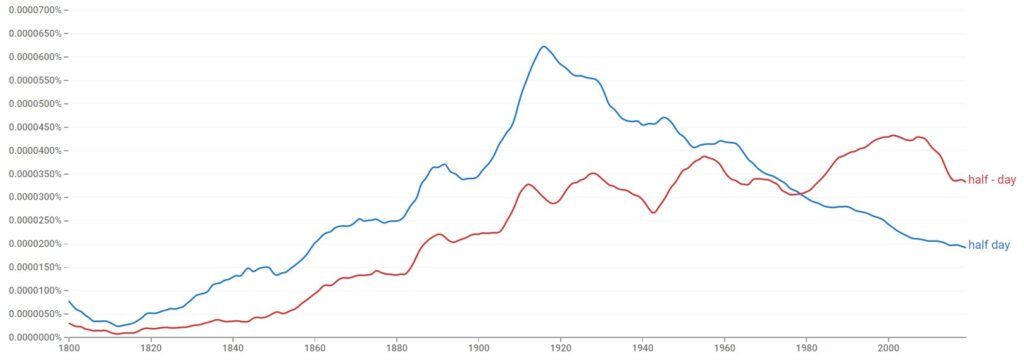We can use “half day” as both a noun and an adjective. However, it would be useful to know which way it’s written in which form. This article will look into whether it’s one or two words or whether the hyphenated form is more suitable.
Half day vs. Half-day
“Half day” is correct when we use it as a noun. In this way, we are talking about half of a working day without any other nouns being modified. “Half-day” is correct when used as an adjective, meaning that it does modify another noun in the sentence.

According to Google Ngram Viewer, “half-day” is the more popular choice of the two. However, you can see that there isn’t much of a difference between either choice, which shows that they’re both correct and depends more on context than correctness.

In The Oxford Dictionary and The Cambridge Dictionary, “half day” is defined as a noun. We use it when we are talking about people only working for half of their usual hours in a day.
Both dictionaries also recognize the hyphenated form of “half-day.” They both use it as an adjective, and the examples demonstrate the modified noun after it to show how it works.
If you don’t quite understand the differences, you can check them out here:
- Adjective: I’m going to check out this half-day program to see if it’s any good.
- Noun: We’re only working for a half day. Then we’re free to go home!
Half day
“Half day” does not need to be hyphenated when it is a noun. Instead, we can write it as two separate words, which allows us to talk about working for half of a normal day. There are no other nouns present to modify in this style.
In this form, “half” acts as the adjective to modify the noun “day.” We can use “half” to show that only half of a day is being worked, which is why it works well without the hyphen.
These examples should clear up any problems you might be having:
- If you’re looking to have a half day, you need to make sure you’re working hard enough to get it done.
- I would love a half day! I think it’s so much more fun when I get some free time to myself.
- A half day would go a long way right now! We should check whether that’s okay with the boss.
- I need a half day! There’s so much going on in my life right now!
Half-day
“Half-day” should always be hyphenated when it is an adjective. This is standard practice in English, and we need to make sure the hyphen is included when a noun is clearly being modified. Without the hyphen, “half” would modify “day” and ignore the other noun.
We can refer to AP Stylebook guidelines when it comes to using hyphens. According to the guidelines, hyphens connect multiple words when they are modifying the same noun.
The AP style rules make it much easier for readers to recognize when a noun is modified and when “half day” is a noun itself. Usually, the noun of choice comes directly after “half-day” to help us understand it.
Check out these examples to help you figure it out:
- I didn’t think the half-day shift was going to be this exhausting, but I really hated it.
- You should have gone on the half-day course with me! It wasn’t long, and I learned so much.
- The half-day program they put in place wasn’t necessary, but I still had to go and see what it was about.
- If you’re interested in a half-day relaxation event, I know just the guy who can set it all up for us!
Is “Day” Capitalized In The Word “Half-Day”?
Finally, let’s spend a bit of time looking at how to capitalize the hyphenated form. Some people struggle with this, so make sure you pay attention!
“Half-day” is not a proper noun. Therefore, unless we start a sentence with it, neither portion of the word needs a capital letter.
However, if you are including it in a title, you might find that “Half-Day” makes more sense when both parts are capitalized. This applies when you capitalize every other word in your title.

Martin holds a Master’s degree in Finance and International Business. He has six years of experience in professional communication with clients, executives, and colleagues. Furthermore, he has teaching experience from Aarhus University. Martin has been featured as an expert in communication and teaching on Forbes and Shopify. Read more about Martin here.
